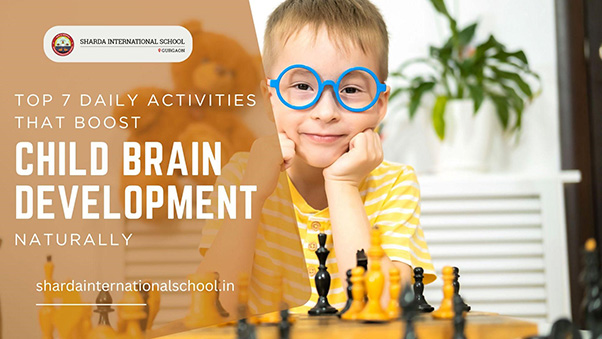Top 07 Daily Activities That Boost Child Brain Development Naturally

The first few years of a child's life are more than just cuddles and cartoon time. These are the years when the
brain is growing at a speed that never happens again. In fact, according to the Center on the
Developing Child at Harvard University, 90% of a child’s brain develops before the age of five.
Every touch, word, song and game is shaping how your child thinks, learns and interacts with
the world. That's why it's so important to give them the right kind of stimulation every
single day.
"Play is the highest form of research."
- Albert Einstein
Child brain development does not need fancy toys or expensive gadgets.
Often the best results come from everyday activities that are fun and easy.
In this blog, we will walk you through seven simple things you can do daily
to help your child's brain grow naturally. These are small steps with big
results.
7 Daily Activities That Help Boost Child Brain Development
1. Reading Together
Reading is one of the most powerful tools to grow a child’s brain. A bedtime story or a colourful picture book may
seem small but the impact is massive. Studies show that children who are read to daily develop larger vocabularies
and stronger communication skills.
Reading not only improves language and listening but also helps in attention span and imagination. When a child hears
you read aloud, it activates brain areas linked to visual imagery, story understanding and memory. Even 10 minutes
a day can do wonders for child brain development.
2. Free Play Time
Let them build a tower, knock it down and build again. Free play means play with no fixed rules. It
allows children to explore ideas, solve problems and think independently. Whether it’s pretending
to run a shop or being a superhero for the day, such activities activate different parts of the
brain that boost emotional and cognitive growth.
This form of open-ended play builds confidence and improves decision-making. It’s the kind of
mental workout that every child’s brain needs for healthy development.
3. Outdoor Adventures
Outdoor play is more than running around. Nature wakes up the senses and activates areas in the brain related to
curiosity, observation and calmness. Kids who spend more time outdoors have better focus and reduced stress
levels. Exposure to natural light also helps in proper sleep cycles, which supports brain health.
So take them to a park, let them water the plants or just lie on the grass and look at the sky. Nature
helps in child brain development by keeping them mentally and emotionally balanced.
4. Music and Rhythm
Ever seen a toddler dance to a tune? That’s not just fun – it’s brain work. Music improves memory, language and even
math skills. A child clapping to a beat or singing a rhyme is building pattern recognition and coordination.
Introducing simple instruments or even pots and pans to tap on can boost hearing skills and rhythm
understanding. Music is a fun way to support child brain development because it combines joy with
structure and repetition.
5. Talking and Asking Questions
Children are naturally curious. And that’s a good thing. Conversations – even small ones – are like fuel for their
brain. When you explain things or ask questions, you’re helping them think in new ways. This daily back-and-forth
builds language, logic and emotional understanding.
Don’t shy away from their never-ending questions. Instead, ask them what they think and talk it
through. These conversations are one of the strongest drivers of child brain development.
6. Helping with Daily Chores
It may sound surprising but kids helping around the house can also grow their brains. Simple tasks like watering
plants or organising books teach structure, memory and responsibility. These tasks give children a sense of
ownership, which boosts their self-esteem.
Learning through chores connects thinking with doing – a vital part of developing executive
function. In short, these little jobs offer big lessons for child brain development without
feeling like “work.”
7. Drawing and Doodling
Hand them a crayon and watch their thoughts come alive on paper. Drawing helps kids express feelings they cannot say
in words. It also improves fine motor skills and visual analysis.
A study published in the Journal of Early Childhood Research found that drawing activities improve
creativity and help with memory retention in young learners. That makes doodling more than just
fun – it becomes a doorway to learning and emotional release. When done daily, it supports
calmness, clarity and child brain development.
Conclusion
It’s easy to feel that child brain development needs high-end tools or special classes. But often it’s the simple
things that have the most lasting impact. Talking, playing, helping out and being curious – these are the real
building blocks of a strong brain.
"Children must be taught how to think not what to think."
- Margaret Mead
As parents and educators, the goal should be to nurture habits that support growth in every way – mentally, emotionally
and socially. Schools also have a key role. The ones that focus on real-life skills alongside studies see better
all-around growth in students. This is why at Sharda International School, we promote holistic learning and
believe in building curious minds through well-designed experiences and
creative activities for students in school
.
So whether it’s reading a story, letting them water plants or just singing together, know that every small moment
is growing their brain. One simple day at a time.Everyday moments, from reading a story to watering plants or
singing, nurture a child brain development, one simple day at a time.